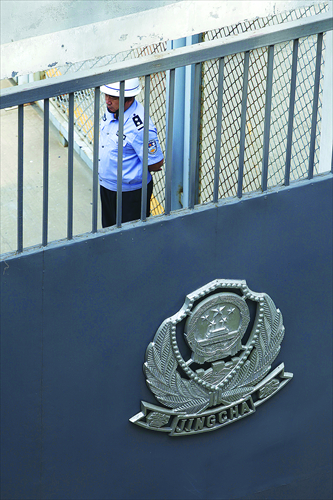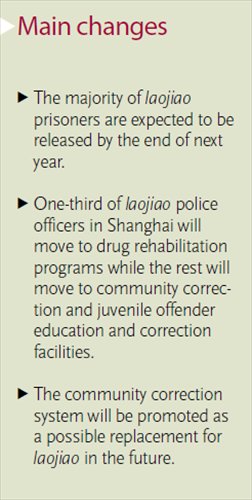Reeducation without labor

A police officer guards the entrance of the Shijiazhuang Reeducation Through Labor Camp before it opens its doors for an open day in Hebei Province, on May 23, 2012. Photo: CFP
When 27-year-old Ren Jianyu from China's southwest Chongqing Municipality received a call from the Global Times on November 15 to be told that the reeducation through labor system was to be officially abolished, the then victim of the system began to weep.
"I'm so excited. I feel that all the efforts from people like me who have been wronged have paid off," Ren said.
Ren was deprived of his freedom and put in the reeducation through labor, or laojiao program, for two years for "spreading negative information and inciting the subversion of State power" in 2011. His case drew nationwide attention, and Ren was released last November after he had served half his sentence.
The controversial correction system was officially slated for abolition in an announcement from the Third Plenary Session of the 18th CPC Central Committee in early November.
Previously, under the laojiao system, people could be detained for up to four years without an open trial. In the last few years, several highly controversial cases, including Ren's, prompted nationwide criticism and calls for the system to be scrapped.
Tang Hui is another person whose case became notorious throughout the nation. She was put in the program in Central China's Hunan Province in August last year after petitioning for harsher punishments for the people convicted of raping her daughter and forcing her into prostitution. Tang's sentence was overturned eight days later.
"We hope Tang's case will be the last before laojiao is abolished," Xu Liping, Tang's lawyer said.
Zhang Jie, Tang's husband, told the Global Times that they were happy justice had been done and hoped no more victims would be wronged.
The abolition of laojiao is seen as a major part of the country's efforts to protect human rights.
Many scholars agree that the system was appropriate for a certain historical period in China, but is no longer suitable today as it lacks a legal basis and goes against the criminal law and the constitution. It had also become the source of a growing number of cases of abuse of power and illegal deprivation of citizens' rights in China.
Many believe that the end of the 56-year-old system may mark the start of judicial reform in China in the coming decade.
Timetable for closure
According to a press release from the Central Judicial Reform Office explaining the move on Monday, the abolition of the reeducation through labor system is a result of a drive to perfect the Chinese comprehensive legal system.
The announcement stated that most offenders who were given laojiao sentences in the past can now be given corresponding punishments based on related laws. For example, more than half of laojiao offenders were drug users, and according to the anti-drug law published in 2007, they can now be sent for compulsory drug rehabilitation.
The 2006 Public Security Administration Punishments Law gave details of penalties for unlawful acts deemed not serious enough for criminal punishment. The amendment to the criminal law in recent years also added burglary, carrying weapons, theft, pick pocketing, extortion and other crimes that directly violated citizens' legitimate rights and interests as criminal acts.
As a result, in recent years, the number of people put through reeducation through labor decreased while the sentences were also shortened. In fact, most reeducation camps stopped accepting new cases in March after Meng Jianzhu, chief of the Commission for Political and Legal Affairs of the CPC Central Committee, announced that there were plans to abolish laojiao by the end of the year in a government meeting in January.
However, although the decision was officially stated in a top document by the authorities, the laojiao program will not be formally abolished until the top legislature, the National People's Congress, amends the law, which is expected to take place late this month.
But some local authorities have already started to move. Four days after the central government made the announcement, Shanghai became the first provincial region in the country to announce that all laojiao prisoners had been released and the authority had begun work on changing the system.
At almost the same time, Hangzhou in Zhejiang Province, Changsha in Hunan Province and Qingdao in Shandong Province all announced that laojiao prisoners had been released.
While most offenders in reeducation camp had sentences of less than two years, it is expected that the majority of them will be released by the end of next year. It is also likely that all laojiao prisoners will receive an amnesty when the system is officially abolished at the end of this year, said experts.
Shanghai judicial authorities refused an interview request when the Global Times contacted them for detailed arrangements, saying that they would work under the unified arrangements of the central authority.

Personnel reshuffle
A source close to the Shanghai judicial authority who asked not to be named told the Global Times that among some 800 laojiao police officers in Shanghai, one-third will move to drug rehabilitation programs while the rest will move to community correction and juvenile offender education and correction facilities.
"Actually, most reeducation camps in China since 2007 had two signs: one was reeducation through labor camp and the other was drug rehabilitation, while they actually worked together. Therefore, it is easy for laojiao police officers to move to drug rehabilitation work and community correction work after receiving training," he said.
The source said officers from laojiao camps will receive training on the new arrangements at judicial schools later this month in Shanghai.
"But the situation is not always that easy for different provinces that had a relatively large number of laojiao officers. The abolition will be a challenge for them in terms of resettling employees," he said.
According to people.com.cn, the reeducation camps in Jiangsu Province released all laojiao prisoners by last weekend and announced that they had all been put in compulsory drug rehabilitation centers.
Official figures show that China currently has some 350 reeducation camps, and the people kept there are mainly convicted of theft, fraud, gambling, affray, and for repeat crimes such as prostitution and taking drugs.
Although there is not yet a detailed plan to clarify the transition period before and after the laojiao system is ended, there are several signs that the justice department has already launched serious reforms inside the system.
According to a press release by the Shanghai authorities on November 19, those previously held under the laojiao system will be dealt with under the Public Security Administration Punishments Law, Criminal Law and Criminal Procedure Law.
For minor criminal offenders, correction through specific education will be the main method instead of compulsory reeducation through labor, and this work will be done in collaboration with judicial officers and social correctional institutions.
"This means people previously sentenced under laojiao will be treated differently. Those whose acts do not constitute a crime will be punished by administrative penalties, and those whose acts constitute a minor part of a crime will be held criminally responsible strictly based on the law," Professor Miao Weiming from the criminal justice department at East China University of Political Science and Law, told the Global Times.
New system
On the other hand, the central authority's announcement mentioned that the community correction system will be promoted, which some see as a possible replacement for laojiao in the future.
Currently, community correction is only applied to convicted criminals sentenced to lighter punishments such as public surveillance and probation, or convicts out on parole. Authorities say the purpose of community correction is to help those convicted of minor illegal acts return to society more easily.
Community correction is widely applied in many countries. China launched its pilot program in 2003 and implemented it nationwide in 2009.
Official figures show that some 1.66 million people have received community corrections while 1 million of them were released by the end of October. Only 0.2 percent repeated their crimes during the community correction period.
Zhao Dacheng, vice-minister of the Ministry of Justice, said at a news conference last Friday that some people had misunderstood community correction as being a new form of laojiao.
"Laojiao and community correction are very different in their legal bases, range of applications and executing procedure. Laojiao is for those who committed unlawful acts but were not convicted while community correction is for certain types of convicted criminals," Zhao said.
But some legal experts say it is necessary to perfect the community correction system to address possible problems that might emerge after the abolition of laojiao.
"A related law is needed as soon as possible to clarify the judicial procedure and the object of law enforcement as well as which authority should make decisions and be responsible to prevent the errors of laojiao," Chen Youxi, law professor at Renmin University of China, said.
"Laojiao was the last compulsory measure restricting citizen's freedom without a clear legal basis in China, and it should be no more," Chen said.